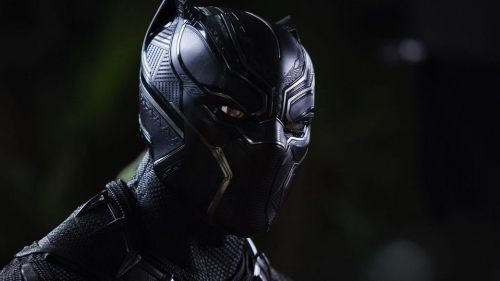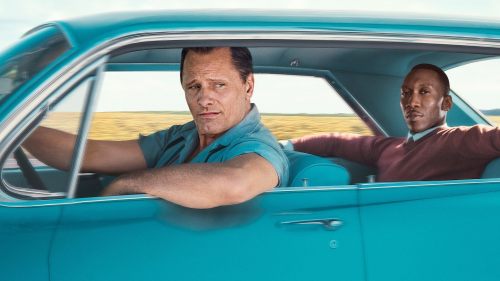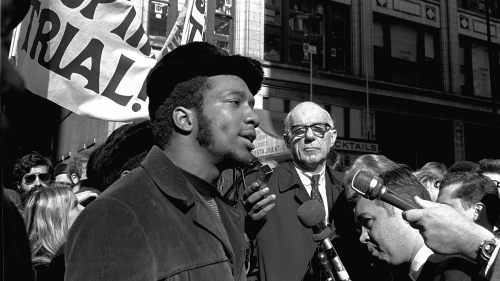The Fleshing Out Of Black Masculine Archetypes In Ryan Coogler’s Films
Black Panther is almost here. Get your tickets now!
In his essay “Many Thousands Gone” James Baldwin, who was never afraid to appraise even the most celebrated and valued elements of the Black American community with a critical perspective, infamously criticized Native Son, the most popular and influential novel of his mentor and friend, Richard Wright. The same novel, funny enough, that Baldwin is referring to in the essay collection wherein that critical piece lies, Notes of a Native Son. Baldwin’s argument was that, even though Wright’s novel, and it’s young 20-year-old protagonist, Bigger, represented the intense frustration of poverty and social inequality for Black men in America during the 1930s, it was limited by the fact that representation was all Wright’s novel really accomplished. What Baldwin wanted was more complex:
...the relationship that Negroes bear to one another, that depth of involvement and unspoken recognition of shared experience which creates a way of life. What the novel reflects - and at no point interprets - is the isolation of the Negro within his own group and the resulting fury of impatient scorn. It is this which creates its climate of anarchy and unmotivated and unapprehended disaster; and it is this climate…which has led us all to believe that in Negro life there exists no tradition, no field of manners, no possibility of ritual or intercourse, such as may, for example, sustain the Jew even after he has left his father’s house.
Baldwin was calling for what makes great art: the combination of psychological, emotional, and social complexity that informs the identities of individuals within the contexts of the communities and societies of which they are a part. It is a combination that’s impossible to accomplish completely but, thankfully, full completion is never necessary. Even despite its limitations, the influence of Wright’s Native Son is undeniable, and Baldwin also spoke to the strength of the novel’s influence, and the truth of its limited perspective. Because luckily, there are enough artists speaking to the human experience to allow for the mass of undeniable mistakes that, themselves, give insight into the truths we all strive to understand. But, to understand what we’ve succeeded in expressing, and what we’ve yet to express, requires a critical, unflinching consideration of everything we’ve accomplished, and failed to accomplish, before.
That unflinching eye is what makes Ryan Coogler’s first two feature films, Fruitvale Station and Creed, such deeply resonant and truthful evocations of the Black experience in America. His protagonists, a drug dealer and a boxer, respectively, are foundational archetypal figures in 20th and 21st century America’s perception of blackness. Coogler considers our expectations of these figures, their loaded history, the specific American social conditions that formed them. But he also looks at the communities that they are a part of, the relationships that matter to them, the boundaries they have the potential to transcend. And he knows the importance of their identities, their names: Oscar Grant III, and Adonis Creed.
The image of the Black drug dealer is the image of will. Mostly men who, when faced with insurmountable institutional barriers, force material success. The unique combination of Black poverty and drive reveals the darkest impulses of America’s capitalistic ethos. And, like Juan in Barry Jenkin’s Moonlight, they manifest as troubled paternal figures within the Black communities. In a society that rewards materialism, the potential of a drug dealer’s relative wealth, and their position as a source of income for their communities, leads to an undeniable influence. But as Chiron’s drug-addicted mother points out in Moonlight, Juan’s wealth and influence comes at the cost of the people within his own community who are addicted to the drugs he sells. And the social influence and integration of the hypermasculinity within gang culture that forms out of drug trade, oftentimes perceived within the black community as the shield that protects them from the most direct threats of institutional racism, is what causes the social persecution of women and LGBTQ, like Chiron, within the Black community. And yet the influence on Black culture, and on Black pop culture (which is really American culture and American pop culture) through hip hop, is undeniable. Jay-Z put it all concisely in ‘The Story of OJ’, “I told him. ‘please don’t die over the neighborhood/That your mama rentin’/Take your drug money and buy the neighborhood/That’s how you rinse it.”
In the White American conscience, the Black drug dealer represents the fear of Black social and economic self-sufficiency. A direct threat to the trickle-down Reaganomic ideology that designedly distributes wealth to a White majority. A threat that, in the 1980s, escalated the hyper-criminalization of the Black drug trade, crack and cannabis, while relatively (and hypocritically) normalizing the White drug trades like cocaine and heroin. All of which remains a part of the effort to socially neuter Black communities into White social and economic dependency.
These stigmas, and many more, are part of the fabric of Oscar Grant’s identity and environment in Fruitvale Station. He’s a marijuana dealer in San Francisco’s Palma Ceia neighborhood. He loses his supermarket job for showing up late to shifts. He’s easily bated by his rivalry with the DGF street gang. Oscar, in many ways, encapsulates White American fears and expectations of Black drug dealers, and Coogler doesn’t diminish these aspects of Oscar’s identity.
Instead, Coogler deepens Oscar’s humanity by emphasizing his place within his family and community. There’s an overarching theme of resolution in Fruitvale Station because the entire movie takes place between the morning of New Year's Eve (and also his mother’s birthday) and the early morning of New Years Day, the last day of the real-life Oscar Grant’s life. Exactly a year before, Oscar was in jail, and now that he’s with his family, Oscar’s relationships counter the assumptions of the singleness of his identity.
Sophina, a nurse, the mother of Oscar’s daughter Tatiana, and Oscar’s girlfriend, wants to increase her trust in Oscar. Oscar’s recent infidelity keeps her from being able to fully depend on him, but his insistence that he wants to commit to her and his loving relationship with their daughter stops her from dismissing him outright. When Oscar admits that he lied about still having his supermarket job, and that he was fired two weeks before, Sophina is furious. But when Oscar also admits that he dumped the drugs he had planned on selling and wants to make money legally, Sophina recognizes Oscar’s vulnerability and responds with reconciliation.
Tatiana (“T”), Oscar’s and Sophina’s young daughter, has a fun and loving relationship with Oscar. When Oscar is in jail he refuses to let Tatiana visit him out of shame and a desire to keep from exposing her to the drug dealing and gang culture environment that he’s a part of, an environment his mother argues he’s already exposed her to. And because Oscar won’t see her while he’s in jail, Tatiana begins to think Oscar prefers that environment to her, a misconception Oscar must make time to undo as he rebuilds his relationship with his daughter.
Oscar’s mother, Wanda, eventually tired of visiting her son in prison because she felt that she was enabling his pattern of harmful behavior. Wanda makes the decision after Oscar is successfully baited by a rival gang member in the middle of a story she tells him about Tatiana. This same scene is recalled by Oscar as the impetus for dumping his remaining drugs to attempt to earn money legally. And, later on, when Wanda’s insistence that Oscar ride the train to stay safe becomes the scene of his death, when Sophina convinces Oscar to stay out because she wants to have a fun night out with him, one gets a sense of the futility in the Black community, and Black women especially, of trying to avoid the danger that is systematically ingrained, and therefore forever present.
Oscar’s other interactions: a pitbull he plays with that dies in his arms, his lie to his friend about getting his job back after his manager refuses to hire him, calling his grandmother to help a random white woman prepare fish fry, a conversation with a married man about his reservations about marrying Sophina, and his joking fun with his friends all add dimensions to Oscar’s character well beyond the limits of expectation. The positive aspects of his life become a litmus test; can you envision these qualities in a person like Oscar, beyond your impressions based off of social characterization? And, even more interestingly, how do these qualities balance with the reality of his mistakes? What do his relationships reveal about his overall humanity? And, considering it all, the question becomes whether or not Oscar deserved to die for his mistakes, which was really his humanity.
The Black boxer is another complex American archetypal icon. There’s a key aspirational aspect to the boxer that has always been integral in his relationship to Black communities, and whose popularity has heavily affected both Black self-esteem and white estimations of Black men. Joe Louis became an international sensation. His media persona was so closely maintained by his black manager, John Roxborough, that the “seven commandments” of maintaining his media image included the inability to take photos with white women or gloat over his defeated white opponents. His loss and later avenging defeat of German boxer Max Schmeling became a dramatization of the World War II conflict between Democracy and Nazism. His military service was used by the American Federal Government to boost troop morale. His participation in the PGA Tour’s 1952 San Diego Open helped set the stage for racial integration in American sports. And in his late life, he suffered a vulturous financial takedown by the same Federal Government, via the IRS, that so excitedly used him as a symbol. The Black American boxer has been at the nexus of careful social and political negotiation, the aspirational grandeur of Black athlete’s international popularity, gradations of appreciation and fetishization of Black athletics, and the culling and control of Black athletes as individuals to suit National interests.
These factors were then made more complex by Muhammad Ali, whose combination of self-confidence and unmatched ability became synonymous with the Civil Rights struggle, whose involvement with the Nation of Islam, an organization whose combination of respectability, black nationalism, and call for black secession successfully organized former convicts and criminals into members of society that threatened white hierarchy, helped turn the image of the black boxer into not just an aspirational figure, but a spiritually uplifting one as well that sought to detach from the motives of a racially prejudiced government.
And yet today, Floyd Mayweather’s widely publicized financial success and hypermasculine persona reflects a vision of American capitalistic success that’s unable to fully examine the enabling of domestic abuse.
Through Adonis (Donnie) Creed, Coogler examines the mix of a unique, mixed-class background that navigates the boundaries of the very aggressive world of boxing. Donnie, himself the product of his father’s infidelity, an emotional betrayal of his wife Mary Anne Creed, is nevertheless taken out of foster care by Mary Anne and is given all of the social and financial opportunities to live a successful life. Yet he is unable to completely emotionally process the dichotomy between his passion for boxing and the resentment he still has against his father for being absent in his life. The fact that this absent father was also one of the best boxers in the world places him in his father’s shadow, and the question raised is how much is his love for boxing his own individual identity, and how much is it a reaction to his emotional frustrations with his father? This question is compounded by the characters who assert that boxing is a sport for lower-income kids, a way out for those who don’t have Donnie’s social advantages through Mary Anne.
Donnie’s’ frustration manifests itself in how he leverages guilt about his subsequent abandonment after his father’s death - first to his extended family through Tony "Little Duke" Burton, owner of the Delphi Boxing Academy, and later on to Rocky. During this stage in Donnie’s development, Coogler introduces the various boxers with onscreen stat cards that emphasizes a by-the-numbers conception of the boxing world that Adonis attempts to encroach on.
Because there’s more to a fighter than their stat-line, Donnie only starts to gain headway when he develops psychologically and emotionally. His relationship with Bianca, a young musician whose progressive hearing loss doesn’t stop her from making the music that probably compounds her condition, parallels Donnie's passion for boxing despite reminders from Mary Anne and Rocky that Apollo died in the ring. Bianca’s insistence that Adonis be honest and faithful with her, and her break off from their relationship when Donnie’s temper results in a physical conflict during an important show for her, emphasizes the importance of emotional maturity for Adonis. It’s only after Donnie confronts his own toxic masculine tendencies, by working through Rocky’s own masculine front, that Bianca is willing to reconcile with him. Rocky uses his masculinity to hide from the emotional pain of his wife’s death and fear when he himself is diagnosed with cancer, to the point that he refuses treatment and almost lets himself die.
There is also the parallel with Ricky Conlan, who is sentenced to seven years in prison for gun possession, and who forfeits a fight by angrily punching his opponent in the jaw. Conlan’s hyper-aggressiveness puts his family’s financial security in jeopardy, and his manager leverages Adonis’ paternal heritage to draw interest and secure his family’s future while Conley’s in prison.
The nature of the boxing world is embellished by Coogler’s dynamic fight scenes, which are as exciting, well-paced, and dramatic as they are violent and brutal. Coogler balances the fun, interesting aspects of boxing with the voyeuristic and exploitative aspects of the boxing community. When Apollo’s infidelity is brought up, it’s hardly discussed by sports commentators before being brushed to the side in favor of Apollo’s legacy. And though Mary Anne and Adonis come to peace with Apollo’s actions, the sports community at large seems unconcerned with how they are individually affected by Apollo’s cheating.
The honest depiction of the environments of his movie’s settings, the agency and complexity of his female characters in addition to his protagonists, and the interest in how his characters are shaped by and in turn influence their environments and communities, transforms what could be interesting character studies into evocations of the psychological and emotional complexities of Black Archetypal figures within the black community. The facets of Oscar’s and Adonis’ identities that result from the honest examination of the various historical and social factors that established the worlds they are a part of expands our understanding Black American environments, and the importance of the characters’ relationships chronicles and expands the Black way of life.



